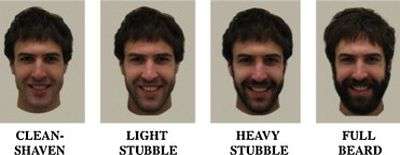April 29, 2013 report
Study finds men most attractive with heavy-stubble

(Medical Xpress)—A research team from the Evolution and Ecology Research Centre at the University of New South Wales has found that women find men most attractive when they have approximately ten days of beard growth. In their paper published in the journal Evolution and Human Behavior, the team describes how volunteers asked to look at pictures of men with various stages of beard growth, found men with ten days growth to be the most attractive and those with five days growth to be the least.
To gain a better understanding of male attractiveness from the perspective of both men and women, the team enlisted the assistance of 351 women, 177 heterosexual men, and 10 other men to serve as models. Each of the models was photographed in four ways: fully shaven, with 5 days of beard growth (light stubble), with 10 days of beard growth (heavy stubble), and with a fully grown beard. The photographs were then shown to each of the male and female volunteers who were asked to rate the men in them according to degree of attractiveness.
After analyzing the data and calculating scores, the researchers found that women found the men with the heavy stubble to be the most attractive—those with full beards or clean shaven faces tied for second and those with light stubble were deemed the least attractive. Men judged the men in the pictures with full beards to be as attractive as those with full stubble, while those who were clean shaven were less so, and those with light stubble the least attractive of all.
As part of the study, the researchers also quizzed the female volunteers about their menstrual cycles and whether they were using oral contraceptives to see if it altered their perception of attractiveness of the men in the photographs—it didn't, though those that were ovulating at the time of the study did find men more masculine as more hair appeared on their face.
The researchers can't explain why people find men with heavy stubble more attractive, though they suggest it's likely tied to contributing to a mature and masculine image. Interestingly, they found that the volunteers all found men with full beards to be more aggressive-looking, but likely better at parenting than men with less facial hair. They also suggested that light stubble might be the least attractive because of its patchy nature.
More information: The role of facial hair in women's perceptions of men's attractiveness, health, masculinity and parenting abilities, Evolution and Human Behavior, Volume 34, Issue 3, May 2013, Pages 236–241. www.sciencedirect.com/science/ … ii/S1090513813000226
Abstract
Facial hair strongly influences people's judgments of men's socio-sexual attributes. However, the nature of these judgments is often contradictory. The levels of intermediate facial hair growth presented to raters and the stage of female raters' menstrual cycles might have influenced past findings. We quantified men's and women's judgments of attractiveness, health, masculinity and parenting abilities for photographs of men who were clean-shaven, lightly or heavily stubbled and fully bearded. We also tested the effect of the menstrual cycle and hormonal contraceptive use on women's ratings. Women judged faces with heavy stubble as most attractive and heavy beards, light stubble and clean-shaven faces as similarly less attractive. In contrast, men rated full beards and heavy stubble as most attractive, followed closely by clean-shaven and light stubble as least attractive. Men and women rated full beards highest for parenting ability and healthiness. Masculinity ratings increased linearly as facial hair increased, and this effect was more pronounced in women in the fertile phase of the menstrual cycle, although attractiveness ratings did not differ according to fertility. Our findings confirm that beardedness affects judgments of male socio-sexual attributes and suggest that an intermediate level of beardedness is most attractive while full-bearded men may be perceived as better fathers who could protect and invest in offspring.
© 2013 Medical Xpress

















